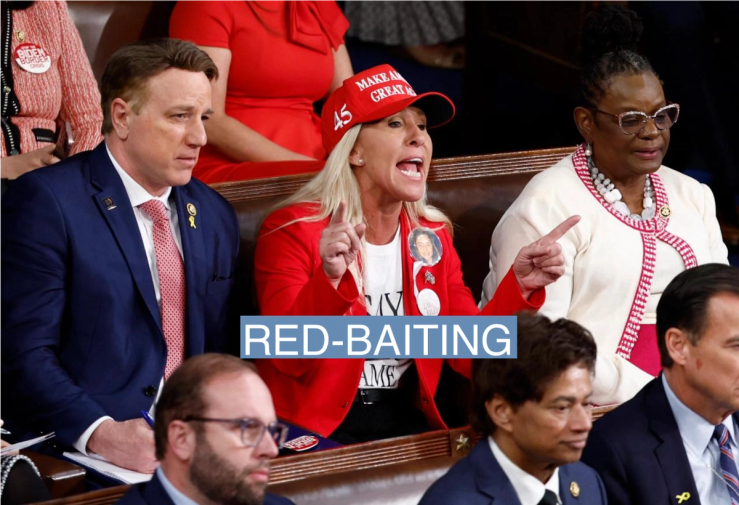The Scene
Tuesday’s primary guaranteed a Trump-Biden rematch. Thursday night’s State of the Union showed how the current president would fight it — more liberal populism, more contempt for the MAGA movement, and a strategic retreat on immigration.
“Not since President Lincoln and the Civil War have freedom and democracy been under assault at home as they are today,” Biden said, connecting Trump’s 2020 election denial to his refusal to commit to defending NATO allies from Russia.
On policy, Biden again attacked Republicans for blocking a border security bill, looking to neutralize one of their best-polling issues. And he repeatedly accused them of trying to roll back middle class benefits to free up cash for wealthy Americans’ priorities.
“You guys don’t want another $2 trillion tax cut?” President Joe Biden said, baiting the Republican side of the room by saying that the party wanted to keep tax cuts for the rich and inflate the deficit. “I kind of thought that’s what your plan was.”
In this article:
David’s view
An election-year State of the Union is always a campaign speech, whether or not D.C. tastemakers and norms-lovers like it. Biden delivered his after a GOP primary that had been wrapped up with record speed, and Super Tuesday primaries that had, with very few exceptions, advanced the most pro-Trump, pro-MAGA candidates available to voters. The newest crop of Republican nominees gave Democrats confidence his message would translate up and down the ballot come November.
In North Carolina, Lt. Gov. Mark Robinson easily won the party’s gubernatorial nomination, and giddy Democrats cracked open their file of his bizarre and alienating speeches. In Texas, judges and state legislators who’d crossed Attorney Gen. Ken Paxton lost most of their races — often after former president Donald Trump endorsed their opponents, a favor for an ally who’d tried to overturn the 2020 election and survived an impeachment over corruption accusations last year.
“They are the extreme of the extreme,” said Abhi Rahman, a spokesman for the Democratic Legislative Campaign Committee, which believes that MAGA candidates can help Democrats flip more seats and reduce GOP supermajorities in the states. “They’re eating the people who were the extremists.”
The emerging Democratic strategy is two-fold. One: They need to counteract “Trump amnesia,” the catchall term for voters forgetting aspects of his presidency that they hated in real time. The top of Biden’s remarks, invoking the Jan. 6 riots and how Republicans had memory-holed them, was part of that.
Outside of California’s central valley, where the House GOP’s super PAC spent money to help Rep. David Valadao beat a challenger who attacked his vote for Trump’s post-Jan. 6 impeachment, the party was nominating MAGA candidates who kept insisting that the 2020 election was stolen. As Trump locked up the nomination this week, Arizona U.S. Senate candidate Kari Lake was picking up support from GOP leaders, ensuring that the swing state’s Republican ticket would be led by two candidates who’d lost it.
“They just don’t really align with the voters of Arizona,” said Arizona Rep. Ruben Gallego, who got a break in his race against Lake this week when independent Sen. Kyrsten Sinema opted not to run again. “She scared the hell out of people last cycle, and she has not gotten any better. Look at how she’s treated the McCain family, or how she just treated Nikki Haley on her way out.”
The second part of the strategy looks forward — a people-versus-the-powerful message, portraying Trump as a catspaw for right-wing economic interests.
“I wish there was more coverage of the Trump record of tax cuts for corporations and the wealthy,” said North Carolina Rep. Wiley Nickel, a Democrat leaving the House this year after Republicans re-drew the state’s map and made his seat unwinnable. “That’s their record. If Republicans have unified government, Social Security and Medicare will be on the chopping block.”
Biden worked that angle on Thursday, repeatedly, calling out United Auto Workers President Shawn Fain in the gallery and highlighting the GOP’s least popular economic policies. As Semafor’s Shelby Talcott reports, the campaign is increasingly focusing on Project 2025, the Heritage Foundation’s compendium of policy and personnel advice for the next Republican president. Hillary Clinton’s unsuccessful 2016 campaign separated Trump from the rest of the GOP, citing then-House Speaker Paul Ryan as a character witness. Biden is binding them together.
The View From Republicans
The GOP rebuttal started with in-house heckling, and continued with Alabama Sen. Katie Britt, whose official response mostly got panned on style. It was far heavier on immigration than economics, with mentions of high prices but no reference to tax rates. “His reckless spending dug our economy into a hole and sent the cost of living through the roof,” said Britt, blaming Biden for “soaring mortgage rates and sky-high childcare costs.”
Notable
- In The Washington Post, Paul Kane runs down the Tuesday primaries that shrunk the “bloc of House Republicans who prefer governance over political performance art.”
- In Politico, Paul Demko, Jeremy B. White, and Jason Beeferman recap the week’s progressive candidate and policy defeats, which also showed what ground Democrats were giving up.
- In Vanity Fair, Joe Hagan blows “Taps” for the Haley campaign and the GOP primary, “it was unclear what Haley intended to do with any ostensible movement, how she might translate it into political capital after the primaries.”


